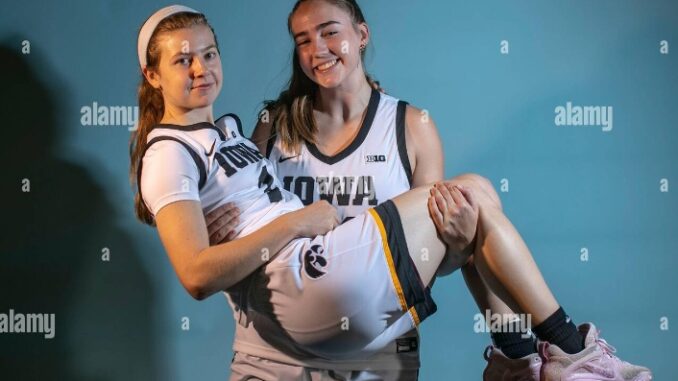
Suspension News: Iowa Hawkeyes Guard Molly Davis and Forward AJ Ediger Suspended Over Alleged Lesbianism…
**Iowa City, IA** – In a surprising and controversial move, the University of Iowa’s athletic department has suspended two prominent players from its women’s basketball team. Guard Molly Davis and forward AJ Ediger have been suspended indefinitely amidst allegations concerning their personal relationship. This decision has sparked a heated debate about privacy, inclusivity, and the ethics of university policies.
### The Incident
The suspension was announced after rumors circulated within the campus and athletic community about the nature of the relationship between Davis and Ediger. It is alleged that the two players were involved in a consensual romantic relationship. The university has not officially confirmed the reasons for the suspension, citing privacy and ongoing investigations, but the context strongly suggests the relationship as the central issue.
### University’s Statement
In a brief press release, the University of Iowa’s athletic department stated:
> “The University of Iowa takes all matters concerning student-athletes seriously. We are committed to upholding the highest standards of conduct and ensuring a respectful and inclusive environment for all. As such, we have placed Molly Davis and AJ Ediger on suspension pending further investigation.”
The statement has been criticized for its lack of clarity and failure to address the specific nature of the allegations.
### Reactions and Backlash
The suspension has led to a significant backlash from various quarters. LGBTQ+ advocacy groups, student organizations, and many in the sporting community have condemned the decision as discriminatory and an invasion of privacy. Critics argue that the university’s action perpetuates a stigma against LGBTQ+ individuals and infringes upon the players’ personal lives.
Rachel Garcia, president of the campus LGBTQ+ alliance, expressed her disappointment:
> “This suspension is not just about two athletes; it reflects a broader issue of how LGBTQ+ individuals are treated in sports and society. Molly and AJ’s relationship should be their business alone, and it’s disheartening to see such a regressive stance from the university.”
Former players and alumni have also voiced their concerns. Jessica Roberts, a former Iowa Hawkeyes player, shared her thoughts on social media:
> “Sports should be a place where everyone feels safe and accepted. It’s heartbreaking to see Molly and AJ being targeted for who they are. The university needs to do better.”
### Legal and Ethical Implications
Legal experts have pointed out that the suspension could open the university to potential lawsuits. Title IX, a federal civil rights law that prohibits sex-based discrimination in any school or education program that receives federal funding, could be central to any legal challenges. The law has been interpreted to cover discrimination based on sexual orientation and gender identity.
Professor Laura Stevens, an expert in education law, commented:
> “If the suspension is indeed related to the players’ sexual orientation or relationship, the university could be in violation of Title IX. This case could set a significant precedent for how LGBTQ+ issues are handled in college sports.”
### Moving Forward
As the investigation continues, the future of Davis and Ediger with the Iowa Hawkeyes remains uncertain. The university has promised a thorough and fair investigation, but the damage to its reputation and the morale of the team may already be done.
In the meantime, supporters of Davis and Ediger are organizing rallies and petitions to demand their reinstatement and to raise awareness about LGBTQ+ rights in sports. The hashtag #StandWithMollyAndAJ has gained traction on social media, with thousands showing their support for the athletes.
### Conclusion
The suspension of Molly Davis and AJ Ediger has brought to light significant issues concerning privacy, discrimination, and inclusivity in college sports. As the University of Iowa navigates this complex situation, it faces increasing pressure to uphold principles of fairness and equality. The outcome of this controversy will likely have lasting implications for the university and could influence policies across collegiate athletics nationwide.
Leave a Reply